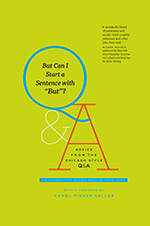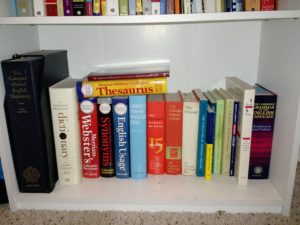Book Review: But Can I Start a Sentence with “But”?
Disclosure: I received a free copy of this book from the University of Chicago Press.
I have to admit that I was a little skeptical when I heard that the University of Chicago Press was putting out a collection of questions and answers from the popular Chicago Style Q&A. What’s the point of having it in book form when the online Q&A is freely available and easily searchable? And yet I have to admit that this charming little gift book is one of the best books on editing I’ve ever read.
If you’re not familiar with the Chicago Style Q&A, it’s a place where anyone can submit a question to the staff in the manuscript editing department at the University of Chicago Press. Selected questions and answers are then posted monthly. I don’t read the Q&A regularly, but when you search Chicago’s website, answers from the Q&A appear in the results. It’s a great repository of answers to questions that aren’t necessarily covered in the manual itself.
Because the book is simply a compilation of questions and answers, the organization is necessarily somewhat loose, though the books editors have grouped them into topics such as Possessives and Attributes, How Do You Cite . . . ?, and, one of my favorites, Things That Freak Us Out. If you’re not familiar with the Chicago Style Q&A, you may not know that the editors have developed a bit of a snarky voice. Maybe it’s a result of staring of pages and pages of text all day or of dealing with recalcitrant authors. Or maybe the editors have just been asked one too many times about something that could have been found in the manual if the person asking had just looked. Whatever the reason for it, it makes reading the answers a lot of fun.
For example, when someone asked if an abbreviation with periods should then be followed by another period if it appears at the end of the sentence, they respond, “Seriously, have you ever seen two periods in a row like that in print? If we told you to put two periods, would you do it? Would you set your hair on fire if CMOS said you should?” Or when someone asks innocently enough, “Can I use the first person?”, they answer, “Evidently.” And when someone asks why it’s so hard to find things in the manual, they write, “It must just be one of those things. If only there were a search box, or an index . . .” And when a US Marine threatened to deploy a detail of marines to invade Chicago’s offices and impose the outdated two-spaces-after-a-sentence rule, they reply, “As a US Marine, you’re probably an expert at something, but I’m afraid it’s not this.” The editors at Chicago clearly suffer no fools.
But in between the bits of dry wit and singeing snark are some truly thoughtful remarks on the craft of editing. For instance, when someone says that they don’t think it’s helpful to write out “graphics interchange format” in full the first time when referring to GIFs, the editors simply respond, “You never have to do anything that isn’t helpful. If a style guide says you do, you need a better style guide.” Or when someone asks if you always need commas after introductory phrases like “in the summer of 1812”, they answer, “Rejoice: everyone is correct. Higher authorities are not interested in legislating commas to this degree. Peace.”
Even at a thousand pages or more, The Chicago Manual of Style can’t provide answers to everything, nor should it. Editing that relies on a list of black-and-white edicts tends to be mechanical and to miss the forest of the text for the trees of commas and hyphens. If you want to be a good editor, you have to learn how to use your head. As the editors say, “Make your choice with a view to minimizing inconsistencies, and record them in your style sheet.” There’s not always one right answer. Sometimes you just have to pick one and stick with it.
But perhaps my favorite answer is the last one in the book:
Q. My library shelves are full. I need to make some difficult decisions to make space for new arrivals. Is there any reason to keep my CMOS 14th and 15th editions?
A. What a question. If you had more children, would you give away your firstborn? Find a board and build another shelf.
Here’s my bookcase of editing and language books at home. Obviously it’s time for me to build another shelf.
But Can I Start a Sentence with “But”? Advice from the Chicago Style Q&A is available now. You can buy it from Amazon or your favorite bookseller.


Neil B.
I don’t know that I could agree more with your assessment, Jonathon. I look forward to every monthly Q&A installment from CMoS. Thanks for saying what I haven’t and for spreading the word. I’ll also take the opportunity to thank you for *your* writing; I am excited to see each announcement of a post and enjoy reading your reflections.
Jonathon Owen
Thank you, Neil!